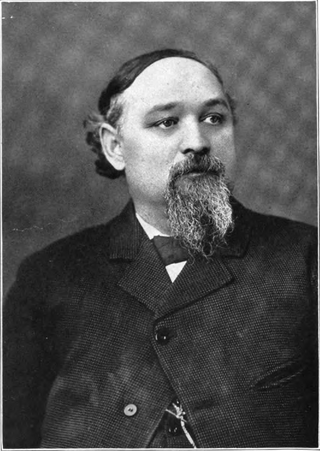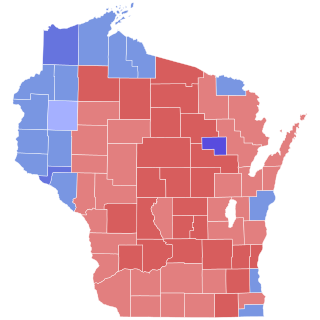Related Research Articles

Thomas Lynch was an American lawyer and Democratic politician from the U.S. state of Wisconsin. He served two terms in the United States House of Representatives, representing Wisconsin's 9th congressional district. He was also the first mayor of Antigo, Wisconsin, and served two terms in the Wisconsin State Assembly.

Edward Sloman Minor was an American businessman, Republican politician, and Wisconsin pioneer. He served six terms in the United States House of Representatives, representing northeastern Wisconsin (1895–1907). He was also the 7th and 16th mayor of Sturgeon Bay, Wisconsin, represented Door County for seven years in the Wisconsin Legislature, and served as a Union Army cavalry officer during the American Civil War.

The Speaker of the Wisconsin State Assembly is the presiding officer of the Wisconsin State Assembly, the lower house of the Wisconsin Legislature. Article IV of the Constitution of Wisconsin, ratified in 1848, establishes the legislature and specifies the election of officers. The role and responsibilities of the speaker are defined in the Assembly Rules, originally in Rule 1, and also, under the present rules, Rule 3.

Charles Edward Estabrook was an American educator, lawyer, eugenicist, and Republican politician from the U.S. state of Wisconsin. He was the 14th Attorney General of Wisconsin and served 14 years in the Wisconsin State Assembly, representing first Manitowoc and later Milwaukee. As a young man, he was an enlisted volunteer in the Union Army during the American Civil War. Later, he founded the Wisconsin Historical Commission and published several volumes of history of the Civil War for the Wisconsin Historical Society.

Milan Hibbard Sessions was an American lawyer, Republican politician, and pioneer of Wisconsin and Nebraska. He served in the Wisconsin Senate, Wisconsin State Assembly, and Nebraska House of Representatives, and was speaker of the Nebraska House of Representatives during the 1873 session. Earlier in life, he served as a Union Army officer in the American Civil War.

John Fetzer was a German American immigrant, merchant, and Democratic politician. He was a member of the Wisconsin State Senate, representing Door, Marinette, and Oconto counties during the 1891 and 1893 sessions. He also represented Door County in the State Assembly in 1885 and served in the Union Army during the American Civil War.
George B. Reed was an American lawyer, railroad executive, Democratic politician, and Wisconsin pioneer. He served six years in the Wisconsin State Senate, representing Manitowoc County, and also served as county judge and the first village president of Manitowoc, Wisconsin. He was known as the "father of the Wisconsin Central Railroad" which connected Lake Superior to Milwaukee. He was also the co-founder and namesake of Reedsville, Wisconsin, in Manitowoc County.
Curtis Reed was an American businessman, Democratic politician, and Wisconsin pioneer. He is considered the founder of Menasha, Wisconsin, and was the first village president after its incorporation in 1853, he subsequently served as the 8th mayor of Menasha after it became a city. He also served two terms in the Wisconsin State Assembly, in 1853 and 1861.
James Larsin was an American ship carpenter and fisherman from Menekaunee, Wisconsin who spent one term as a Union Labor Party member of the Wisconsin State Assembly from Marinette County.
Samuel Lane Plummer was a member of the Wisconsin State Assembly in 1874.
Jacob J. Aulenbacher was a member of the Wisconsin State Assembly.
George Davis McDill was an American lawyer and Republican politician. He served four years in the Wisconsin State Assembly, representing Polk County and surrounding areas. He also served four years as district attorney of Polk County and was chairman of the county board of supervisors. He served in the Iron Brigade of the Army of the Potomac through most of the American Civil War.

The 1848 Wisconsin gubernatorial election was held on May 8, 1848. This was the election for the first Governor of Wisconsin, which became a U.S. state that year, as it was held concurrent with a public referendum to ratify the Constitution of Wisconsin.

The 1978 Wisconsin gubernatorial election was held on November 7, 1978. Republican Lee S. Dreyfus won the election with 54% of the vote, winning his first term as Governor of Wisconsin and defeating incumbent Democrat Martin J. Schreiber. Bob Kasten unsuccessfully sought the Republican nomination.

The 1849 Wisconsin gubernatorial election was held on November 6, 1849. Democrat Nelson Dewey won the election with 52% of the vote, winning his second term as Governor of Wisconsin. Dewey defeated Whig Party candidate Alexander L. Collins and Free Soil Party candidate Warren Chase.

Thomas Reynolds was an Irish American immigrant, farmer, and Republican politician. He was a member of the Wisconsin State Assembly, representing Door County during the 1907 and 1909 sessions. He was the father of John W. Reynolds, Sr.—the 26th attorney general of Wisconsin—and the grandfather of John W. Reynolds, Jr.—a federal judge and the 36th governor of Wisconsin.

The Fourth Wisconsin Legislature convened in regular session from January 8, 1851, to March 17, 1851. Senators representing odd-numbered districts were newly elected for this session and served the first year of a two-year term. Assembly members were elected to a one-year term. Assembly members and odd-numbered senators were elected in the general election on November 5, 1850. Senators representing even-numbered districts were serving the second year of their two-year term, having been elected in the general election held on November 6, 1849.

The 1859 Wisconsin gubernatorial election was held on November 8, 1859. Republican Party incumbent Governor Alexander Randall won re-election with 53% of the vote, defeating Democratic candidate Harrison Carroll Hobart.

The Twentieth Wisconsin Legislature convened from January 9, 1867, to April 11, 1867, in regular session.

The Thirtieth Wisconsin Legislature convened from January 10, 1877, to March 8, 1877, in regular session.
References
- ↑ Hjalmar R. Holand, ed. (1917). History of Door County Wisconsin, the County Beautiful, vol. 1. Chicago: S. J. Clarke Publishing Co. p. 108. Retrieved 2015-06-12.
- ↑ A. J. Turner, ed. (1874). The Legislative Manual of the State of Wisconsin (13th ed.). Madison, Wis.: Atwood & Culver. pp. 458–459. Retrieved 2015-06-17.